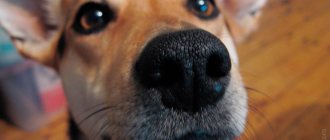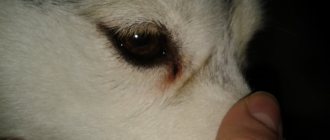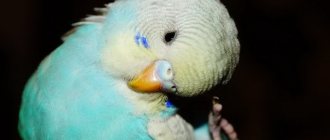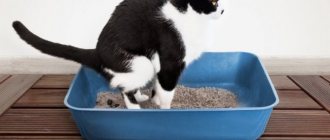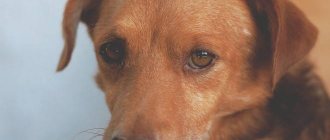Diseases
Almost all eye pathologies at an early stage force the dog to cover its eyes. This happens due to the onset of the inflammatory process.
Conjunctivitis
This is an infectious disease in which the mucous membrane becomes inflamed. In this case, profuse purulent discharge is formed.
By squinting, the dog moistens the cornea, reducing pain.
Dry eye syndrome
This is a severe ophthalmological disease in animals. During inflammation, the lacrimal gland does not work well, the cornea and eyelid dry out, and the conjunctiva is affected. Dry eyes are susceptible to infections and viruses.
At the first stage, purulent conjunctivitis develops, then keratitis.
At the last stage of the disease, if there is no treatment, the dog will become completely blind.
Corneal ulcer
Another name for the disease is ulcerative keratitis. With this pathology, the upper epithelial layer of the cornea becomes ulcerated. The disease is painful for the pet as it causes severe pain.
Blepharitis
If an animal's eyelids are swollen, this is blepharitis. At the same time, the dog is overly anxious or, on the contrary, lethargic and avoids any contact.
Other symptoms of the disease:
- photophobia;
- redness and enlargement of the eyelids;
- the animal practically cannot raise its eyelids;
- suppuration;
- profuse lacrimation.
At the first signs of the disease, eye drops are used.
Injuries and their consequences, breed eye diseases
No less serious danger is posed by traumatic injuries to the cornea, leading to the formation of ulcers; further inflammatory process may result in loss (leakage) of the eye. This disease often occurs in dogs of such breeds as bulldogs (French and English), Chihuahuas, pugs, Pekingese, and boxers.
Owners of these dogs should especially carefully monitor the condition of their pet's eyes - but owners of German shepherds should be wary of pannus: this form of keratitis (inflammation of the cornea) is characteristic of this breed.
However, no matter what breed your pet belongs to, you should never ignore alarming symptoms: if the dog squints or scratches its eyes a lot, its eyelids are red, there is purulent discharge, or you thought you noticed some kind of cloudiness, you should: you can consult a doctor faster.
If there are obvious injuries, treatment must be urgent: the count is on hours, sometimes minutes, during which the loss of the eye can be prevented. Timely measures taken - both in case of injuries and chronic diseases - will help preserve your pet's vision.
Physiological reasons
In everyday life, the animal encounters many stimuli that cause it to squint. Some of them can lead to various eye diseases.
Foreign body
Pieces of leaves or grass often get into a small dog's eyes while walking. A puppy may also suffer from such an injury. The animal blinks frequently, closes its eyelids, and tries to rub them with its paw.
At home, a thorough examination is carried out, and if necessary, the eyelids are washed. If the procedure does not help, contact a veterinary hospital.
Injury
While walking on the street, the dog may bump into a branch or get into a fight with another animal. After an injury, the eye waters and closes.
Household chemicals
Cleaning a modern home is rarely complete without the use of chemicals.
In dogs, they can cause allergic reactions in the form of lacrimation and pain. If the dog does not have any visible injuries, you need to monitor how often the animal squints when cleaning is done.
If your pet's eye is closed after a walk, the eyelid is swollen, most likely he was stung by a bee, wasp, or a tick. The animal's eyelids are examined to identify the site of the bite. Afterwards, apply a compress of a weak vinegar solution.
If a tick is found, it is removed according to all the rules, sent to a veterinary hospital for examination, and the animal is given a vaccine against encephalitis.
Eye rubbing
When a pet squints and rubs its eye with its paw, most likely a speck has entered it.
In this way, the dog tries to get rid of the irritant. The owner needs to carefully examine the organ of vision. If an irritant is detected on the surface of the mucous membrane, it is washed with boiled water and wiped with a moistened gauze swab in the direction from the outer corner to the inner one.
Photophobia
If your dog squints in the sun, blepharitis or other eye diseases are suspected.
Photophobia is the first sign of canine distemper. In this case, do not delay seeking help from a veterinarian, especially if the animal does not have all the necessary vaccinations.
What should you do if your dog’s ears, eyes, or other parts of the body are constantly itching?
- If lice, fleas or lice eaters are found, the dog, as well as the floor in the enclosure or apartment, must be treated with a solution of neostomozan, butox, and so on.
- After treatment, 5 days later you need to put a special anti-flea collar on your dog.
- If you suspect linguatulosis, otodecosis, sarcaptosis, or cheyletiosis, it is better to consult a veterinarian for an accurate diagnosis and a correct diagnosis.
- You cannot do without a specialist if you identify an allergen or suspect demodicosis.
Sources:
https://www.royalcanin.com/ru/dogs/health-and-wellbeing/eye-discharge-in-dogs#
https://okdzks.com/page.php?id=504
https://www.zoogruming.ru/sobaka-postoyanno-cheshet-ushi-glaza-i-chto-delat
Squinting one eye
Sometimes dogs squint or close only one eye. The reason for this behavior is simple: an insect bite or injury. If a thorough examination does not reveal any visible damage, look for the bite area around the eye.
An inflamed or protruding eyeball may be a symptom of a disease of the internal organs - liver or kidneys. In this case, monitor the dog’s activity and appetite. If these indicators noticeably decrease, you need to seek help from a specialist.
What to do
When it is noticed that the cat is squinting its eye, it should be carefully examined and washed thoroughly and carefully. Use sterile gauze, but not cotton pads or swabs, to prevent lint from getting into your eyes. Independent use of eye drops containing antimicrobial agents is unacceptable. They can cause harm to health or complicate diagnosis.
If rinsing does not help, seek veterinary help. You need to protect yourself. Touching with unwashed hands can cause infection and cause conjunctivitis. Children should not be allowed to process due to the risk of contracting chlamydia. Pregnant women should not take part in the treatment of pets, because infection with Toxoplasma cannot be ruled out.
If the cat constantly squints and washing the eyes does not help, the pet should be urgently taken to the clinic. The symptom indicates a disease that is dangerous for animals and humans.
Pathology in puppies
Small dogs often have congenital pathologies: a rolled or fused eyelid, lack of tear ducts . All these diseases cause the animal to squint and close its eyelids.
If the puppy rubs its muzzle with its paw, you need to examine its eye; perhaps a speck has gotten into it, which can be easily removed with a moistened gauze swab.
Newborn puppies are carefully examined, and after a week or two the pathology and its causes can be accurately determined.
Some injury-related illnesses can be eliminated. Complex pathologies in puppies cannot be treated.
Treatment
If a foreign body gets into the eye or an allergy to household chemicals develops, the eyeball is washed. Do this with warm boiled water. A small baby syringe is filled with liquid and injected onto the surface of the eyeball.
Rinsing can be done with saline solution or a special pharmacy eye lotion. The latter relieves inflammation and irritation and alleviates the animal’s condition.
Infectious diseases are eliminated with antibiotics, rinsing, and instillation of special drugs into the eyes.
If there is a strong accumulation of discharge around the eyelids, remove it with a solution of boric acid or hydrogen peroxide. If the eye is closed, the upper eyelid is raised, the lower eyelid is lowered and the entire periocular area is washed.
If a dog has a serious eye injury, then it most likely will not even let its owner near it. In this case, diagnosis and treatment are carried out in a veterinary clinic after preliminary anesthesia.
Before arriving at the hospital, the pet is provided with rest and protected from exposure to bright light and drafts.
Eye diseases that are accompanied by lacrimation
If your pet does not have a predisposition to tearing, then the fluid in the eye appears due to health problems. Eye diseases cause discomfort to the animal and can deprive them of vision.
Infectious diseases
When a dog develops excessive tears, a common cause is infection. It is transmitted to pets from sick animals. With plague, the patient develops weakness, fever, hot and dry nose, fever, convulsions and vomiting. There is pus in the tear fluid. The animal loses its appetite.
Important! If a dog gets rabies, he begins to salivate and have convulsions. Behavior changes.
If treatment is not started in time, infectious diseases can lead to death. To avoid getting sick with them, you need to vaccinate your pet.
Glaucoma
The disease appears as a result of a violation of the outflow of tear fluid. Intraocular pressure increases and the retina is destroyed. Glaucoma can begin after corneal trauma, keratitis, cataracts, or be a congenital problem.
The animal experiences lacrimation, enlargement of the eye, swelling and clouding of the cornea, redness, dilation of the pupil and fear of light. Glaucoma leads to blindness. Surgery is necessary to restore vision.
Development of the dangerous disease glaucoma
Allergic reaction
The dog's eyes are running due to intolerance to certain foods, materials, household chemicals, and medications. Severe lacrimation is caused by pollen from flowering plants. The eyes and ears itch, and the dog begins to scratch them. Other symptoms also appear: redness, sneezing, swelling of the nose and eyelids. Due to itchy skin, the dog begins to itch. Things that cause allergies need to be replaced with new ones. You can identify the source of your dog’s reaction by taking tests.
Conjunctivitis
The pet's eye mucosa becomes inflamed. The disease appears due to infection from a sick animal or an allergy to food, household chemicals and pollen.
Another reason is corneal injury. If the dog is ill, the eyes may turn red and purulent discharge may appear. She often closes them.
Keratitis
Inflammation of the cornea occurs after infection or injury. Having become cloudy, the surface becomes lumpy, and purulent discharge appears. The dog squints and is afraid of the light. The disease is accompanied by painful sensations.
Epiphora
Tear canals narrow due to foreign objects entering them, allergies, conjunctivitis, infections and the appearance of neoplasms. Entropion and eversion of the eyelids contribute to the development of the disease. The discharge turns brown. Itching begins underneath and redness appears.
Note! In dogs with brown fur, dark streaks may not be as noticeable. This is dangerous because the owner may miss the onset of epiphora.
Neoplasms on the eyelids
The animal may develop warts, cysts or papillomas on or near the eyelids. They are benign formations. Melanomas and sarcomas are classified as malignant and lead to death. They grow quickly, making the eyelid heavier, preventing the dog from blinking. The lacrimation intensifies. If tumors are detected, they must be promptly removed by a veterinarian.
Neoplasm on a pet's eyelid
Entropion of the eyelids
Refers to birth defects. Eyelashes grow inside the eyelid. They prick the cornea, irritating it. The white of the eye turns red. If this process is not stopped, the dog may lose its vision. Surgery performed by a veterinarian helps.
Eversion of the eyelids
As a result of eversion, tears are not retained for centuries and spill out. The skin under the eye space is constantly wet. Because of this, the pet develops eczema. The development of the disease is prevented by surgical intervention.
